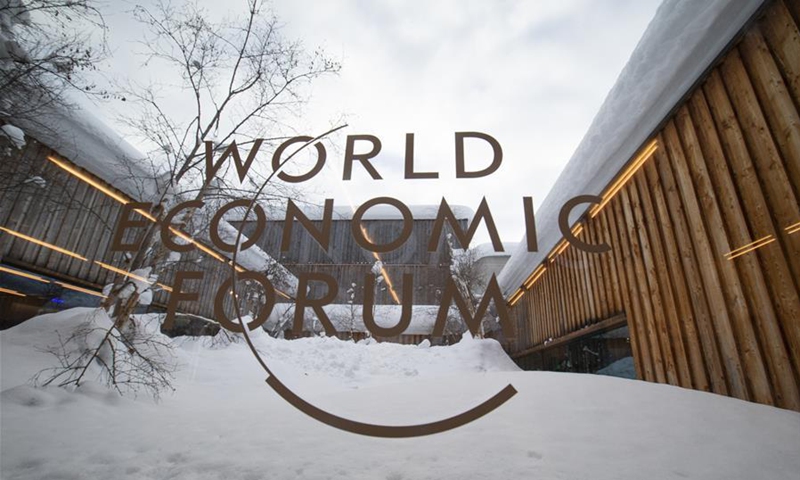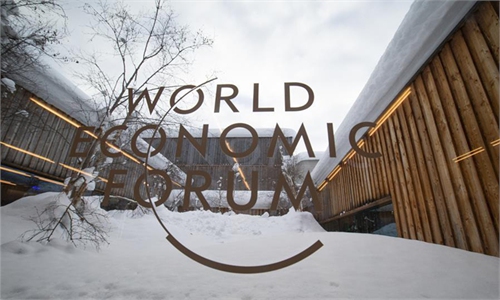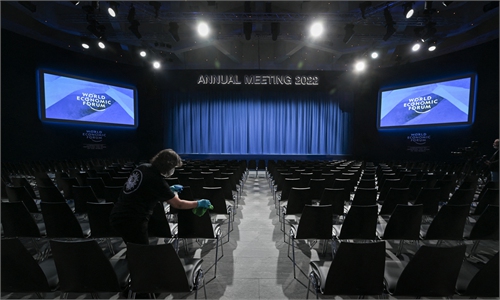China will remain top investment destination: experts at WEF 2022
Foreign businesses stay true to the Chinese market

Photo taken on Jan. 21, 2019 shows the logo of the World Economic Forum (WEF) in Davos, Switzerland. The WEF Annual Meeting will kick off in Davos on Tuesday. (Xinhua/Xu Jinquan)
With China's opening-up policy, continuous optimization of the business environment for foreign companies, and strong economic resilience, it will remain a hot place for investment, said global experts at the World Economic Forum (WEF) 2022 in Davos, expressing confidence in China's economic outlook.WEF President Borge Brende said that he has a lot of confidence in China's economy.
"We are seeing inflation, the highest in 40 years, in some of the key economies. We also see that the Chinese economy is slowing down due to COVID-19. I have a lot of confidence in China's ability to get through these crises. What I do hope for is that in the coming year, China and the US will lower tariffs… because everyone will benefit from this. We are in a win-win world," Brende said in an interview with CGTN.
Billionaire investor David Rubenstein, co-founder of Carlyle Group, on Tuesday said that China has a very bright economic outlook in the long term, during an interview with the Xinhua News Agency.
Marcos Troyjo, president of the New Development Bank, said on Monday that China is like a magnet to attract investors and create opportunities for emerging markets and developing countries. He projected 5 percent GDP growth for China in 2022.
"China will keep being one of the top destinations for foreign direct investment (FDI) for a long time to come. It has always maintained a high level of opening-up, welcoming FDI and bolstering the world economy," said Troyjo at WEF.
He said that China would remain at the forefront of economic growth for years to come, considering the structural shift in China's economic growth model, where a lot of opportunities would be generated in terms of boosting supply and value chains in the world.
China will never be abandoned by foreign capital, as it is a large investment market with 1.4 billion people, Dong Dengxin, director of the Finance and Securities Institute of the Wuhan University of Science and Technology, told the Global Times on Wednesday.
He added that China enjoys a stable sociopolitical environment, and its well-developed supply and industrial chains as well as mature industrial labor force can meet the needs of any investment project in the world.
China has a complete industrial system, with 41 industrial categories, and 666 industrial subcategories, making it the only country in the world with all industrial categories listed in the UN's industrial classification.
"The so-called 'capital outflow' from China is not accurate. Since the 1990s, the introduction and utilization of foreign capital has remained stable and continued to grow without any reversal," Dong noted.
In recent years, the Chinese government has been improving the business environment as well as supporting policies for foreign enterprises, Dong said.
"I believe that China will remain a popular destination for international investment," said Dong.
In 2021, China's actual utilized foreign investment totaled 1.15 trillion yuan ($172 billion), up 14.9 percent year-on-year.
A survey published by German media Frankfurter Allgemeine Zeitung on Monday said that German companies are staying true to the Chinese market.
Politicians in German state Baden-Württemberg are calling for the economy to become more independent of China. But the industrial sector is not thinking about it and is fully committed to China, read the survey.
The largest German corporations do one-fifth or more of their business in China. The Stuttgart Chamber of Industry and Commerce estimates that more than 1,200 companies from Baden-Württemberg are active in China, while there are around 5,000 from all of Germany.
Mercedes-Benz is reportedly increasing its market share in China. It will expand its local presence in the Chinese market.
Trumpf, the German machine toolmaker, said it had no plans to reduce its operations in China or move to other countries. By 2025, half of its sales in the global market will be in China, so it can't withdraw from China, media reported.
The responses from enterprises were consistent with a survey of 4,000 German companies in mid-April by the Ifo Institute for Economic Research. The survey showed that only one-quarter of automobile enterprises wanted to reduce imports from China, while two-thirds had no plans to make any changes.
Three-quarters of German companies relied on auto parts from China, according to the survey.


